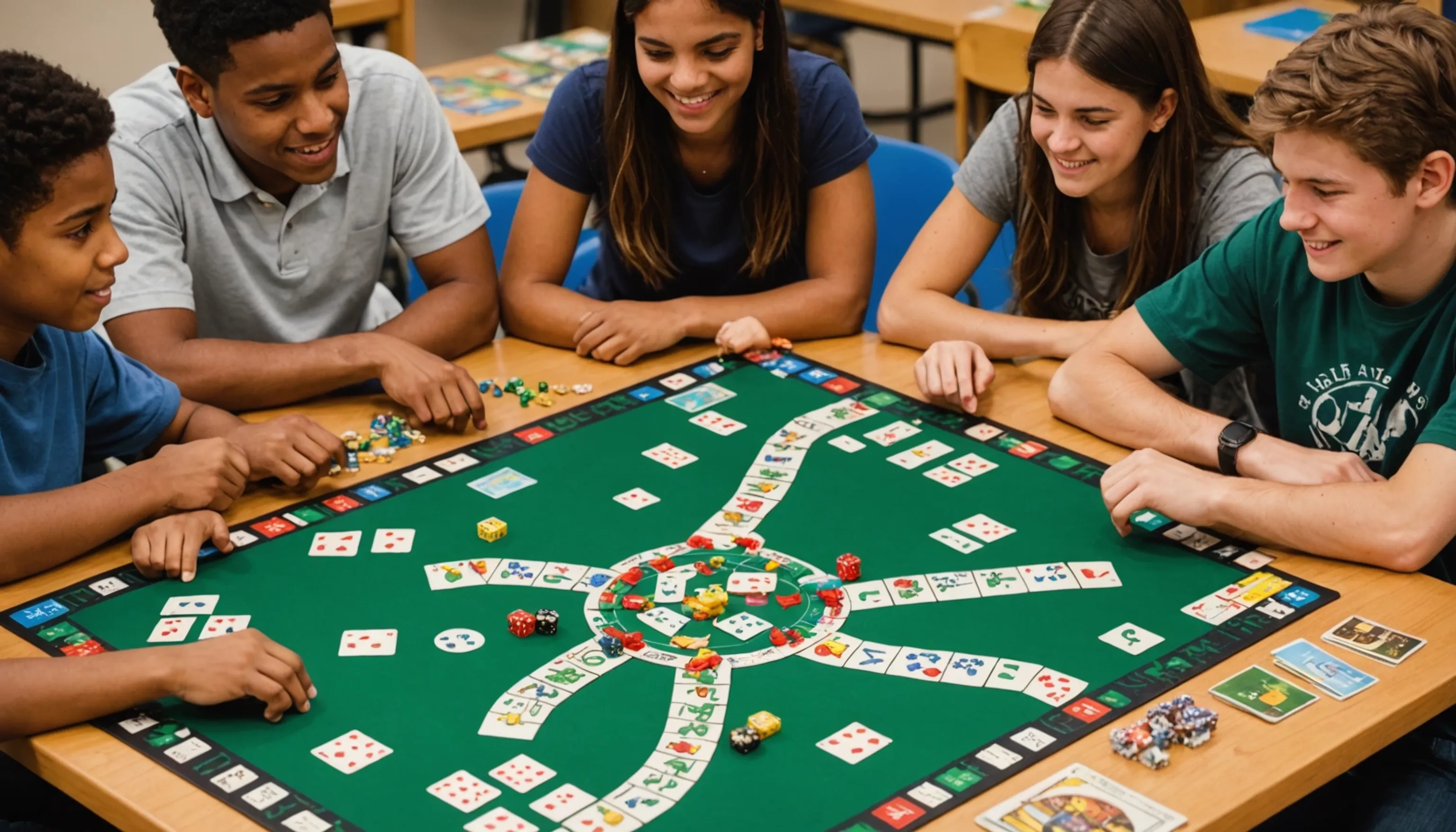Real Math Games for Teens
 HvWHenry van Wagenberg
HvWHenry van Wagenberg
Engaging Real Math Games for Teens
Engaging real math games for teens can transform the often daunting subject of math into an enjoyable experience. These games help to develop critical thinking and problem-solving skills in a fun and interactive way. By incorporating competition and teamwork, teens are more likely to stay motivated and focused. Examples include math-based puzzles, escape room challenges, and interactive online games. These activities not only reinforce math concepts but also foster social skills and collaboration among peers. When teens are engaged in learning through play, they are more likely to retain information and develop a positive attitude toward math.
Benefits of Math Games for Teenagers
Math games offer numerous benefits for teenagers, making learning both enjoyable and effective. Firstly, these games enhance critical thinking and problem-solving skills. By engaging in challenges that require strategic thinking, teens learn to approach math problems from different angles, which fosters a deeper understanding of mathematical concepts.
Moreover, math games promote a positive attitude towards learning. Traditional methods of teaching can sometimes lead to frustration, but by incorporating games, students often feel less pressure and more motivation. This shift in attitude can lead to increased participation and enthusiasm for math-related subjects.
Another significant advantage is the development of social skills. Many math games are designed to be played in groups, encouraging collaboration and teamwork. Teens learn to communicate their ideas effectively, negotiate solutions, and support each other, which are essential skills both in and out of the classroom.
Furthermore, math games can enhance memory retention. The interactive nature of games helps reinforce concepts, making it easier for teenagers to recall information during tests and exams. Studies indicate that students who engage in educational games tend to perform better academically.
Lastly, math games can be easily tailored to suit various learning styles and levels, ensuring that every teen can benefit. Whether through online platforms or board games, these resources make math accessible and enjoyable for all. Overall, integrating math games into learning can lead to improved academic performance and a lifelong love for mathematics.

Types of Real Math Games
There are several types of real math games that can effectively engage teenagers while enhancing their mathematical skills. Each type offers unique benefits and caters to different learning preferences.
1. **Board Games**: Traditional board games like Monopoly and Prime Climb incorporate math concepts such as addition, subtraction, and strategic planning. These games provide a fun way to practice math in a social setting.
2. **Card Games**: Games like Math Bingo or 24 Game encourage quick thinking and mental math skills. Card games can be easily adapted for various skill levels, making them versatile options for different age groups.
3. **Online Math Games**: Websites and apps such as Kahoot! and Prodigy offer interactive platforms where teenagers can play math games that align with their curriculum. These games often include quizzes and challenges that adapt to the player's skill level.
4. **Puzzle Games**: Logic puzzles and brain teasers, such as Sudoku or math riddles, promote critical thinking and problem-solving skills. These games encourage teens to think outside the box while honing their mathematical abilities.
5. **DIY Math Games**: Creating homemade games using everyday items can be a fun and creative way to reinforce math concepts. For example, using dice to create probability games or crafting a math scavenger hunt can make learning interactive and hands-on.
By exploring these diverse types of math games, educators and parents can find engaging ways to support teenagers in developing their math skills while having fun.
Top Real Math Games for Teenagers
Here are some of the top real math games that teenagers love:
- Prodigy Math: An engaging online platform that combines RPG elements with math practice, adapting to each student's level.
- Math Blaster: A classic game that challenges players to solve math problems in a fun, sci-fi setting.
- 24 Game: A fast-paced card game that encourages quick mental calculations and sharpens arithmetic skills.
- Math Bingo: A fun twist on bingo where players solve math problems to mark their cards.
- Prime Climb: A board game that teaches multiplication and division through colorful gameplay.
These games make math learning enjoyable and interactive for teenagers.

Online Math Games
Online math games have become an essential tool for enhancing the math skills of teenagers. These interactive platforms offer a variety of engaging experiences that cater to different learning styles and preferences. Here are some popular online math games that can significantly benefit teens:
1. **Prodigy Math**: This game turns math practice into an adventure, allowing players to create characters and embark on quests. Prodigy adapts its questions to each student’s skill level, ensuring that they are constantly challenged without feeling overwhelmed.
2. **Kahoot!**: A game-based learning platform that allows teachers and parents to create quizzes on various math topics. Teens can compete in real-time, answering questions on their devices. The competitive element keeps them motivated and engaged.
3. **Mathletics**: This comprehensive online resource combines engaging activities with assessments. It offers a wide range of math games, allowing students to practice essential skills while tracking their progress over time.
4. **Coolmath Games**: This website features a plethora of math-related games that focus on logic, strategy, and problem-solving. With options that range from puzzles to skill-based challenges, Coolmath Games keeps learning fun and interactive.
5. **IXL**: While primarily an educational platform, IXL includes interactive games that help reinforce math concepts through engaging exercises. Students can practice at their own pace and receive immediate feedback on their performance.
Overall, online math games provide a dynamic environment where teenagers can improve their math skills while having fun, making them an excellent addition to any learning strategy.
Board Games that Enhance Math Skills
Board games are a fantastic way to enhance math skills in a fun and interactive manner. Here are some popular board games that can effectively teach and reinforce mathematical concepts while keeping teenagers engaged:
1. **Monopoly**: This classic game teaches players about money management, addition, and strategic thinking. As players buy properties, calculate rents, and make financial decisions, they practice essential math skills in a competitive environment.
2. **Prime Climb**: This colorful board game focuses on multiplication and division. Players navigate a spiral board using math operations to move their pieces, making it an excellent way to deepen their understanding of numerical relationships.
3. **Math Dice**: A fast-paced game that encourages mental math skills. Players roll dice and use basic operations to reach a target number, promoting quick thinking and problem-solving abilities.
4. **Blokus**: While primarily a strategy game, Blokus involves spatial reasoning and geometry. Players must fit their pieces on the board while following specific placement rules, which enhances critical thinking and visual-spatial skills.
5. **Set**: A game that focuses on pattern recognition, logic, and deductive reasoning. Players identify sets of cards based on various attributes, helping them develop analytical skills as they play.
6. **Ticket to Ride**: This game combines strategy with geography and basic math, as players calculate routes and manage resources. It encourages planning and critical thinking while reinforcing counting skills.
Incorporating these board games into family game nights or classroom activities can make learning math enjoyable and effective for teenagers.
DIY Math Games at Home
Creating DIY math games at home is a fun and engaging way to help teenagers reinforce their math skills. Here are a few simple ideas:
- Math Scavenger Hunt: Create clues that involve math problems, leading teens to various locations around the house.
- Dice Games: Use dice to create games where players must perform operations like addition or multiplication based on the numbers rolled.
- Math Bingo: Design bingo cards with answers to math problems, calling out the problems for teens to solve.
- Flashcard Challenges: Make flashcards with math problems and have teens race to solve them.
These activities make math practice enjoyable and interactive!
Creating a Math Game with Everyday Items
Creating a math game with everyday items can be a fun and educational way to engage teenagers in learning. Here’s a simple guide to making an exciting math game using items you likely have at home.
**1. Math Relay Race**: This game combines physical activity with math practice. You’ll need two sets of items like cups or small balls, and a timer. Set up two stations with a math problem at each. For example, the first station might have addition problems, and the second could focus on multiplication.
**How to Play**:
- Divide players into two teams.
- Each team sends one member to the first station to solve the math problem. If they answer correctly, they can race back and tag the next teammate.
- Continue until all team members have completed both stations.
**2. DIY Math Board Game**: Use a large piece of cardboard to create a game board. Draw a path with spaces for different math challenges. You can use dice to determine how many spaces to move. For each space, players must solve a math problem to proceed.
**3. Card Games**: Grab a deck of playing cards and assign values. For instance, face cards can represent 10, and players can create addition or subtraction problems based on the cards they draw.
These DIY math games not only make learning math enjoyable but also encourage teamwork and creativity, making math a part of everyday fun!
Using Technology for Math Games
Using technology for math games has revolutionized the way teenagers engage with mathematics. With the rise of educational apps and online platforms, learning math can be both fun and interactive. Here are several ways to incorporate technology into math gaming:
**1. Educational Apps**: There are numerous apps designed specifically to make math learning enjoyable. Apps like Prodigy Math and Kahoot! provide interactive challenges that adapt to the user’s skill level. These apps often include gamified elements like points, levels, and rewards, encouraging teens to practice regularly.
**2. Online Platforms**: Websites such as Coolmath Games and IXL offer a wide variety of math games that cater to different age groups and learning styles. These platforms often include detailed progress tracking, allowing students to see their improvements over time.
**3. Virtual Reality (VR)**: For a more immersive experience, VR math games can transport students into a virtual world where they solve math problems in a dynamic environment. This technology can engage teens in unique ways, making complex concepts easier to grasp.
**4. Interactive Whiteboards**: In classroom settings, interactive whiteboards can be used to play math games that involve the entire class. Teachers can create quizzes where students can participate in real-time, fostering a collaborative learning atmosphere.
**5. Coding and Math**: Introducing coding platforms like Scratch allows students to create their own math games. This not only reinforces math skills but also develops coding abilities, combining two essential skills in today’s digital world.
Incorporating technology into math games makes learning more accessible and engaging, helping teens develop a positive attitude toward math.
